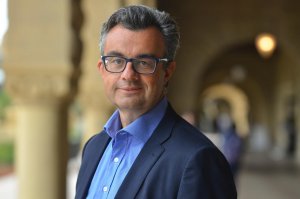Presented By: Michael Woodroofe Lecture Series
Michael Woodroofe Lecture Series: Emmanuel Candes, Professor, Department of Statistics and Mathematics, Stanford University
A New Read on the Knockoff Filter: Statistical Tools for Replicable Selections

Abstract: A common problem in modern statistical applications is to select, from a large set of candidates, a subset of variables which are important for determining an outcome of interest. For instance, the outcome may be disease status and the variables may be hundreds of thousands of single nucleotide polymorphisms on the genome. In this talk, we develop an entirely new read of the knockoffs framework of Barber and Candès (2015), which proposes a general solution to perform variable selection under rigorous type-I error control, without relying on strong modeling assumptions. We show how to apply this solution to a rich family of problems where the distribution of the covariates can be described by a hidden Markov model (HMM). In particular, we develop an exact and efficient algorithm to sample knockoff copies of an HMM, and then argue that combined with the knockoffs selective framework, they provide a natural and powerful tool for performing principled inference in genome-wide association studies with guaranteed FDR control. Finally, our methodology is applied to several datasets aimed at studying the Crohn's disease and several continuous phenotypes, e.g. levels of cholesterol. Time permitting, we will discuss the robustness of our methods.
This is joint work with many people who will be all highlighted during the lecture.
Bio: Emmanuel Candès is the Barnum-Simons Chair in Mathematics and Statistics, a professor of electrical engineering (by courtesy) and a member of the Institute of Computational and Mathematical Engineering at Stanford University. Earlier, Candès was the Ronald and Maxine Linde Professor of Applied and Computational Mathematics at the California Institute of Technology. His research interests are in computational harmonic analysis, statistics, information theory, signal processing and mathematical optimization with applications to the imaging sciences, scientific computing and inverse problems. He received his Ph.D. in statistics from Stanford University in 1998. Candès has received several awards including the Alan T.
Waterman Award from NSF, which is the highest honor bestowed by the National Science Foundation, and which recognizes the achievements of early-career scientists. He has given over 60 plenary lectures at major international conferences, not only in mathematics and statistics but in many other areas as well including biomedical imaging and solid-state physics. He was elected to the National Academy of Sciences and to the American Academy of Arts and Sciences in 2014.
*Welcome reception at 11:00 am in the Statistics Lounge, 450 West Hall
Buffet reception immediately following in 337 West Hall (Don Meyer Commons)
This is joint work with many people who will be all highlighted during the lecture.
Bio: Emmanuel Candès is the Barnum-Simons Chair in Mathematics and Statistics, a professor of electrical engineering (by courtesy) and a member of the Institute of Computational and Mathematical Engineering at Stanford University. Earlier, Candès was the Ronald and Maxine Linde Professor of Applied and Computational Mathematics at the California Institute of Technology. His research interests are in computational harmonic analysis, statistics, information theory, signal processing and mathematical optimization with applications to the imaging sciences, scientific computing and inverse problems. He received his Ph.D. in statistics from Stanford University in 1998. Candès has received several awards including the Alan T.
Waterman Award from NSF, which is the highest honor bestowed by the National Science Foundation, and which recognizes the achievements of early-career scientists. He has given over 60 plenary lectures at major international conferences, not only in mathematics and statistics but in many other areas as well including biomedical imaging and solid-state physics. He was elected to the National Academy of Sciences and to the American Academy of Arts and Sciences in 2014.
*Welcome reception at 11:00 am in the Statistics Lounge, 450 West Hall
Buffet reception immediately following in 337 West Hall (Don Meyer Commons)